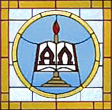 |

|
 |
Study 5: The Kingdom of God Defining The Kingdom | The Kingdom Is Not Now Established | The Kingdom Of God In The Past | The Kingdom Of God In The Future | The Millennium | Digressions (The Literality of the Kingdom, Summary of the History of Israel) | Questions |
Digression 15: The Literality Of The KingdomThe very literal descriptions of the Kingdom found in the Old Testament prophets are often ridiculed by theologians and members of many denominations. It is claimed that the language is figurative of some place of reward other than the earth, seeing that this planet is going to be burnt up. In answer to this, it must be understood that a ground rule of Bible study is that we should always take the Bible literally unless there is good reason to impose a spiritual interpretation. For example, the first verse of the book of Revelation informs us that the vision is largely symbolic (Rev. 1:1), which should guide us in our view of it. There is also a certain sense of aptness and realism in the use of language which can indicate whether or not a passage is to be read symbolically. Thus when we read of the earth staggering like a drunken man (Is. 24:20), it is obvious from the kind of language used that we are intended to read this symbolically. By contrast, the language used to describe the future Kingdom is very easy to understand literally; there is no hint that we should take it symbolically. It would appear that due to men's inability to summon enough faith to believe that such a time really will come here on earth, they have devised theories which explain it away. Their alternative of a spiritual, or heaven-based kingdom, is vague and lacking in detail, therefore there is little to believe in, and little faith is either required or encouraged. If indeed the descriptions of lame people being cured, or deserts being made fertile, are only symbolic, then the question must be specifically and convincingly answered: 'Symbolic of what?" These passages are describing God's Kingdom. If we are unsure what exactly they are symbolic of, then we do not know the Gospel ('good news') about the Kingdom, and therefore cannot expect any place in it. Further, it should be quite clear from all the evidence presented so far, that God has an eternal purpose with man upon this earth; He would not destroy the planet which He had promised to Abraham's seed for ever. We should therefore expect there to be literal descriptions in the Bible of the Kingdom which is to come upon the earth. The following passages confirm this:
The duration of the Millennium for 1,000 years, as recorded in Rev. 20:4, should also be accepted literally, in order to harmonize with other inferences in the prophecies concerning the nature of this period. Even in Revelation, not every number is duty bound to be taken figuratively. The many references in it to "a third" are an obvious example. Most significantly, the Millennium is described in Heb. 4:4-9 as a Sabbath day of rest. With God "a day is as a thousand years" (2 Peter 3:8). After six 'days' of a thousand years in God's purpose with the earth, there will come the Sabbath 'day' of the Millennium. According to the Biblical date for creation, 6,000 years (i.e. 6 'days') from creation brings us to 2,000 A.D. (i.e. creation was at around 4,000 B.C.). This may mean that the beginning of the Millennium could be around 2,000 A.D. For all of us, time is limited. Faced with the prospect of Christ's early return, we need to use our every possible moment in this brief life to prepare ourselves for his coming. |